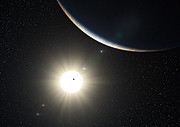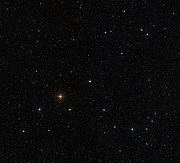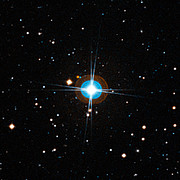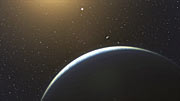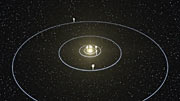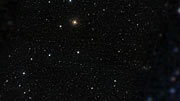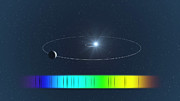Persbericht
Rijkste planetenstelsel ooit ontdekt
- mogelijk zeven planeten die rond een zonachtige ster draaien
24 augustus 2010
Astronomen hebben met behulp van ESO's HARPS-instrument een planetenstelsel ontdekt met zeker vijf planeten die rond de zonachtige ster HD 10180 draaien. De onderzoekers hebben ook bewijs voor de aanwezigheid van nog twee planeten, waarvan één met de laagste massa ooit gevonden. Dat zou het systeem vergelijkbaar maken met ons zonnestelsel, in termen van het aantal planeten (wij hebben er acht). Ook vond het team bewijs dat de afstanden van de planeten tot hun ster een regelmatig patroon volgen, wat in ons zonnestelsel ook het geval is.
"We hebben hoogstwaarschijnlijk een systeem gevonden met de meeste planeten", zegt Christophe Lovis, eerste auteur van een paper over dit resultaat. "Deze opmerkelijke ontdekking onderstreept dat we een nieuw tijdperk binnentreden in onze zoektocht naar exoplaneten: de studie van complexe planetaire systemen in plaats van individuele planeten. Onderzoek aan de bewegingen van de planeten in het nieuwe stelsel, laat complexe zwaartekrachtswerking tussen de planeten zien en geeft ons inzicht in de lange-termijn-evolutie van het systeem."
De astronomen gebruikten de HARPS-spectrograaf op ESO's 3,6-meter telescoop op La Silla in Chili voor een zes jaar lange studie van de zonachtige ster HD 10180, die op een afstand van 127 lichtjaar staat in de richting van het zuidelijke sterrenbeeld Waterslang. HARPS is een instrument met ongeëvenaarde stabiliteit en nauwkeurigheid en daarmee 's werelds succesvolste exoplaneten-jager.
Dankzij 190 HARPS-metingen ontdekten de astronomen de piepkleine schommelingen van de ster, die worden veroorzaakt door de complexe aantrekkingskracht van vijf of meer planeten. De vijf sterkste signalen corresponderen met vijf planeten met de massa van Neptunus - tussen de 13 en 25 keer de massa van de aarde [1] - die om hun ster heen draaien in 6 tot 600 dagen. De afstand van deze planeten tot hun centrale ster 0,06 tot 1,4 keer de afstand aarde-zon.
"We hebben goede redenen om aan te nemen dat er nog twee planeten aanwezig zijn", zegt Lovis. Eén zou een Saturnus-achtige planeet kunnen zijn (met minimaal 65 aard-massa's) die in 2200 dagen rond zijn zon draait. De andere zou de lichtste exoplaneet zijn die ooit is ontdekt, met een massa van 1,4 van die van de aarde. Die staat zeer dicht bij zijn ster, op 2 procent van de afstand aarde-zon. Eén jaar op deze planeet zou maar 1,18 aardse dagen duren.
"Dit object veroorzaakt een wiebeling van de ster van zo'n 3 km/uur - langzamer dan de loopsnelheid - en deze beweging is heel moeilijk te meten", zegt team-lid Damien Ségransan. Als het bestaan van deze planeet wordt bevestigd, zou het een nieuw voorbeeld zijn van een hete, rotsachtige planeet zoals Corot-7b (eso0933).
Het nieuw ontdekte planetenstelsel rond HD 10180 is op diverse manieren uniek. Ten eerste is het in de binnendelen veel dichtbevolkter dan ons eigen zonnestelsel doordat ten minste vijf Neptunus-achtige planeten zich bevinden op een afstand van de ster die valt binnen de baan van Mars [2].
Bovendien heeft het systeem geen Jupiter-achtige gasreuzen. Ook hebben alle planeten vrijwel circulaire banen.
Tot nu toe zijn vijftien planetenstelsels ontdekt met minstens drie planeten. De oude recordhouder was 55 Cancri, die vijf planeten heeft, waarvan twee reuzenplaneten. "Systemen met lage-massaplaneten zoals die rond HD 10180 lijken nogal gewoon te zijn, maar hun vormingsgeschiedenis is nog een raadsel", zegt Lovis.
Door gebruik te maken van de nieuwe data en de gegevens van andere planetenstelsels, vonden de astronomen een equivalent van de zogeheten Titius Bode-wet die in ons zonnestelsel geldt: de afstanden van de planeten tot hun ster lijken een regelmatig patroon te volgen [3]. "Dit zou een 'handtekening' van het vormingsproces van deze planeetstelsels kunnen zijn", zegt teamlid Michel Mayor.
Een ander belangwekkend resultaat is dat er een relatie bestaat tussen de massa van een planetenstelsel en de massa en chemische samenstelling van de moederster. Alle zware planeetsystemen zijn gevonden rond zware, metaalrijke sterren, terwijl de vier lichtste systemen zich rond lichtere en metaalarmere sterren bevinden [4]. Dit soort kenmerken bevestigen de huidige theorieën.
De ontdekking is vandaag aangekondigd op een internationaal colloquium 'Detection and dynamics of transiting exoplanets' aan het Observatoire de Haute-Provence in Frankrijk.
Noten
[1] Door de radiale snelheidsmethode te gebruiken kunnen astronomen alleen de minimummassa van een planeet schatten, omdat de massa ook afhangt van de helling van het baanvlak ten opzichte van de gezichtsrichting, die onbekend is. Vanuit statistisch oogpunt benadert de minimummassa echter vaak de werkelijke massa van een planeet.
[2] Gemiddeld zijn de binnenplaneten van HD 10180 20 keer zo zwaar als de aarde, terwijl onze eigen binnenplaneten (Mercurius, Venus, Aarde, Mars) een gemiddelde massa hebben van de helft van de aarde.
[3] De Titius Bode-wet stelt dat de afstanden van de planeten tot de zon een simpel patroon volgen. Voor de buitenplaneten wordt voorspeld dat elke planeet twee keer zo ver van de zon af staat als de vorige planeet. Deze hypothese voorspelde de banen van Ceres en Uranus correct, maar niet die van Neptunus.
[4] Volgens de definitie die in de sterrenkunde wordt gebruikt, zijn 'metalen' alle elementen behalve waterstof en helium. Dit soort metalen, op enkele lichte chemische elementen na, zijn allemaal ontstaan in de opeenvolgende generaties sterren. Rotsachtige planeten zijn gemaakt van 'metalen'.
Meer informatie
Het onderzoek is gepresenteerd in een paper die verschijnt in Astronomy and Astrophysics (“The HARPS search for southern extra-solar planets. XXVII. Up to seven planets orbiting HD 10180: probing the architecture of low-mass planetary systems” by C. Lovis et al.).
Het team bestaat uit: C. Lovis, D. Ségransan, M. Mayor, S. Udry, F. Pepe, and D. Queloz (Observatoire de Genève, Université de Genève, Switzerland), W. Benz (Universität Bern, Switzerland), F. Bouchy (Institut d’Astrophysique de Paris, France), C. Mordasini (Max-Planck-Institut für Astronomie, Heidelberg, Germany), N. C. Santos (Universidade do Porto, Portugal), J. Laskar (Observatoire de Paris, France), A. Correia (Universidade de Aveiro, Portugal), and J.-L. Bertaux (Université Versailles Saint-Quentin, France) and G. Lo Curto (ESO).
ESO, de Europese Zuidelijke Sterrenwacht, is de belangrijkste intergouvernementele sterrenkundeorganisatie in Europa, en het meest productieve astronomische observatorium ter wereld. ESO wordt ondersteund door 14 landen: België, Denemarken, Duitsland, Finland, Frankrijk, Italië, Nederland, Oostenrijk, Portugal, Spanje, Tsjechië, het Verenigd Koninkrijk, Zweden en Zwitserland. ESO voert een ambitieus programma uit, gericht op het ontwerp, de bouw en het beheer van krachtige grondobservatoria die astronomen in staat stellen om belangrijke wetenschappelijke ontdekkingen te doen. ESO speelt ook een leidende rol bij het bevorderen en organiseren van samenwerking op sterrenkundig gebied. ESO beheert drie waarnemingslocaties van wereldklasse in Chili: La Silla, Paranal en Chajnantor. Op Paranal staat ESO’s Very Large Telescope (VLT), de meest geavanceerde optische sterrenwacht ter wereld. Ook is ESO de Europese partner van de revolutionaire telescoop ALMA. Daarnaast is ESO momenteel bezig met ontwerpstudies voor de 42-meter Europese Extremely Large optische/nabij-infrarood Telescoop (E-ELT), die ‘het grootste oog op de hemel’ ter wereld zal worden.
Links
- Onderzoeksartikel
- Meer informatie: Exoplanet Press Kit
Contact
Christophe Lovis
Observatoire de l’Université de Genève
Switzerland
Mobiel: +41 787 280 354
E-mail: christophe.lovis@unige.ch
Damien Ségransan
Observatoire de l’Université de Genève
Switzerland
Tel: +41 223 792 479
E-mail: damien.segransan@unige.ch
Francesco Pepe
Observatoire de l’Université de Genève
Switzerland
Tel: +41 223 792 396
E-mail: francesco.pepe@unige.ch
Richard Hook
La Silla, Paranal, E-ELT & Survey Telescopes Press Officer
Garching bei München, Germany
Tel: +49 89 3200 6655
E-mail: rhook@eso.org
Marieke Baan (Perscontact Nederland)
ESO Science Outreach Network
en NOVA Informatie Centrum
Tel: +31(0)20-5257480
E-mail: eson-netherlands@eso.org
Over dit bericht
| Persberichten nr.: | eso1035nl |
| Naam: | HD 10180 |
| Type: | Milky Way : Star : Evolutionary Stage : Main Sequence Milky Way : Star : Circumstellar Material : Planetary System |
| Facility: | ESO 3.6-metre telescope |
| Instruments: | HARPS |
| Science data: | 2011A&A...528A.112L |

